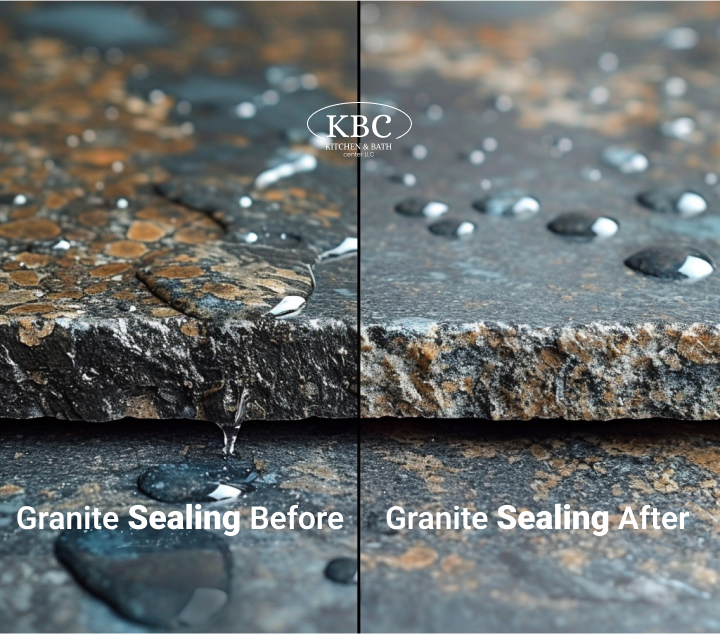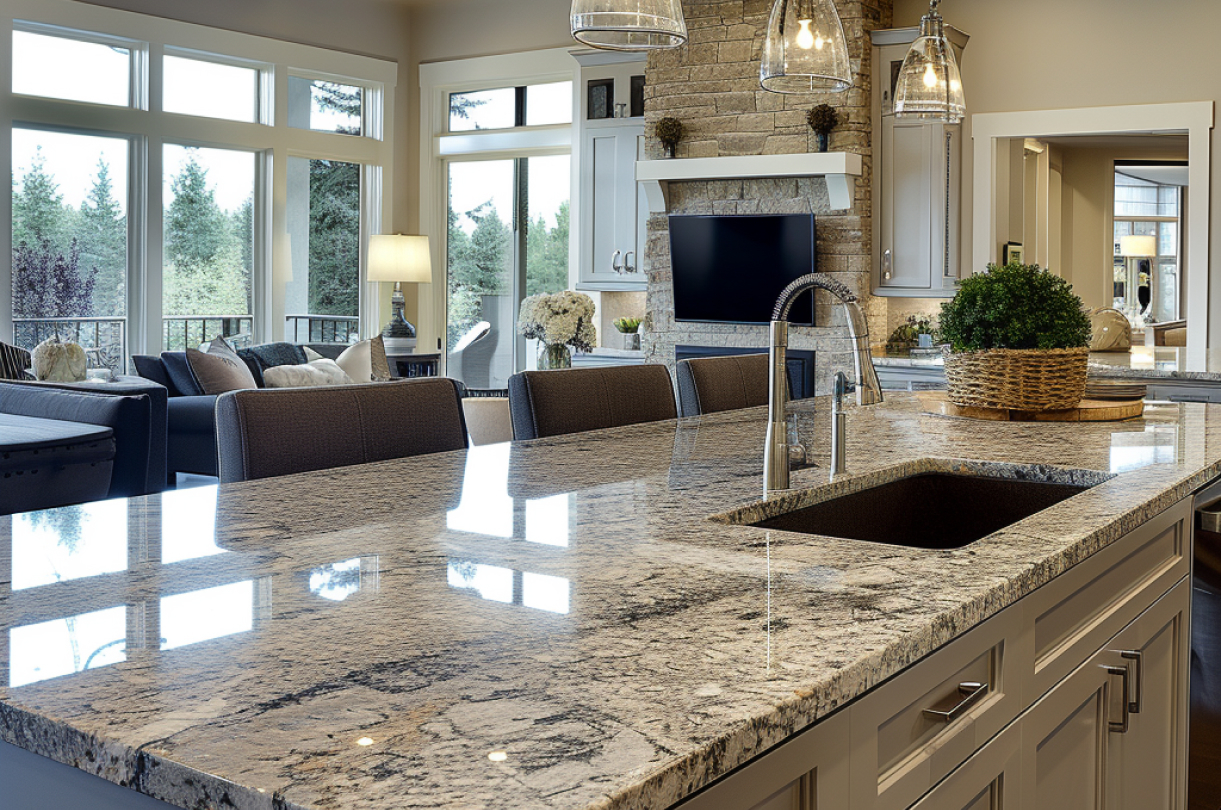Granite, a natural stone, is a popular choice for kitchen countertops, floors, and other high-traffic areas in homes due to its durability and timeless beauty. Each slab of this stone offers a rich tapestry of patterns and colors, making it an attractive modern solution for home designs all around the globe. Despite its strength, granite isn’t impervious to damage, and it requires sealing – applying a protective layer to the stone. So, many owners of granite accessories often ask, “How often to seal granite?”.
Sealing granite is a key step in preserving its resistance to stains, spills, and scratches, and maintaining its pristine condition and longevity. However, there are also some differences to consider. Factors such as the granite’s porosity, the color of the stone, and the intensity of use can all affect the frequency of sealing needs. In this article, we’ll take a look at the essential aspects of granite care, and provide you with practical guidelines on how often to seal your granite countertops to keep them looking their best.
Do granite countertops need to be sealed?
Granite countertops are a staple in kitchens and bathrooms across the globe, renowned for their durability and timeless appeal. Granite has been at the heart of architectural beauty for centuries, with each slab boasting unique patterns and hues. The allure of granite is not just in its appearance; its functionality as a work surface is unparalleled. However, when it comes to maintenance, there is one frequent question homeowners often ask: Does granite need to be sealed?
Granite is a natural stone formed from cooled magma, which means it’s inherently porous to some degree. This characteristic makes granite prone to absorbing liquids. The porosity of granite can vary depending on the exact type of granite you have installed. Some are denser, with an excellent grain, resulting in less porosity, while others might be more absorbent. This difference is important because the more porous the granite, the more likely it is that it can absorb spilled liquid, leading to potential staining.
Do you have to seal granite countertops? Yes. Sealing allows you to protect granite countertops from unwanted stains and other wear and tear that might occur over time, and preserve their attractive appearance for longer. A high-quality sealant acts as a barrier, filling in the porous surface of granite and repelling liquids. Without this protective layer, substances such as oil, wine, or juice can penetrate the surface, leaving behind stains that are tough to remove.
In addition, sealed granite countertops are easier to clean and maintain, which extends their lifespan and ensures that they remain the focal point of any room.

Which granite countertops need sealing?
You have probably heard a lot about how every piece of granite is unique. If you have visited different stores or warehouses when choosing a stone for your new countertop, every consultant has probably reminded you of this. And this is not surprising, because uniqueness is one of the characteristic features of granite and why it is so popular among homeowners. Since granite is a natural stone, it is extracted from the earth and not manufactured by humans. And as we know, nature is the best artist with a unique imagination. That is why you can choose from a variety of colors and patterns of granite to decorate your home. And that is why each countertop has its own sealing needs. Of course, even with such variability, some types of granite have similar properties that can help you choose the best sealing method. The easiest way to determine this is by color. It is the color that usually helps to understand the composition of a particular piece of granite, as well as its density.
As a rule of thumb, dark granite, being denser and more durable, is less porous and less vulnerable to stains, marks, and damage. Some dark granites may not even need to be re-sealed. Lighter granite, however, requires more maintenance. The whitest varieties can absorb liquids like a sponge and may develop permanent stains if not sealed regularly and properly.
How often does granite need to be sealed?
Manufacturers usually seal the granite before installing it in your home. The professional installers at Kitchen & Bath Center advise homeowners on how to care for their new countertops every time the job is completed. Depending on the type of granite, color, porosity, and absorbency of the stone, as well as the location it is installed, the need for and frequency of sealing may vary. Our experts recommend sealing granite countertops at least once a year. However, for countertops that are frequently used or have a lighter shade that is more easily stained, you may need to re-seal every six months. In addition, experts also advise taking into account the lightness of the granite slab, because the lighter the stone, the more often it needs sealing. Are you planning to install granite in the kitchen and like to cook every day? Then sealing granite can also become a regular practice for you.
Want to know when to seal your new granite countertop? It is best to consult with experts who will help you determine all the features of your surface. After all, sealing too infrequently, for example once every 5 years, can cause your countertop to wear out too quickly. On the other hand, over-sealing, or when the sealer is applied too early and does not have time to absorb properly, can leave a hazy, cloudy layer on the surface that will be difficult to remove.
We also recommend caution when using chemical or acidic substances and aggressive detergents on granite. Acidic detergents not only fail to remove stains but also destroy the countertops and wear out or weaken the sealant much faster.
What happens if you don’t seal granite countertops?
If left unsealed, granite countertops can become vulnerable to stains and damage over time. Granite, being a porous material, naturally absorbs liquids. Without proper sealing, liquids spilled in the kitchen, such as wine, oil, coffee, or food can seep into the pores, leaving behind stubborn stains. Regular sealing preserves the beauty and durability of granite, making it shiny and resistant to daily wear and tear. It’s an essential step to ensure that your countertops remain a functional and striking feature of your home for decades.
How to know when to seal your granite countertops
To assess the necessity and frequency of sealing for your granite countertop, conduct a simple water test. Begin by placing a few drops of water onto the surface. If the water is absorbed instantly, leaving a dark spot, your countertop requires urgent sealing with likely multiple coats, and a resealing schedule every few months should be adopted until the absorption rate decreases. Should the water be absorbed within four to five minutes, apply a robust impregnating sealant; this indicates a yearly or biennial resealing may be necessary, with follow-up tests to determine the exact timing.
For countertops that absorb water within 10 to 15 minutes, a single coat of sealant may suffice, with a resealing check every three years. However, if after 30 minutes the water hasn’t soaked in, your countertop is in excellent condition, potentially negating the need for sealing. It’s advised to repeat the water test every three years to decide if future sealing is required based on the granite’s performance.
In addition to water, you can also apply lemon juice and cooking oil to different areas of the countertop. If lemon juice leaves dull spots, the granite might contain calcite, which reacts to acid. Conversely, if the countertop turns dark immediately upon applying oil, it’s absorbent and will benefit from several layers of sealant, followed by a reapplication schedule every three years. If the countertop doesn’t darken or takes more than five minutes to absorb the oil, your countertop is less porous, suggesting a good-quality granite that may not require sealing at all. Always mitigate potential sealer degradation caused by acidic foods and liquids by cleaning spills promptly, using the right cleaner, and cutting on boards rather than directly on the counter.
How to reseal granite countertops
- Preparing the Surface
Before sealing your granite countertops, it’s crucial to ensure they are thoroughly clean. Start by clearing off the countertop and using a sponge and warm water mixed with mild dish soap to scrub away any debris or dirt. Continue until no residue appears on the cloth when wiping the surface. - Drying
Once the cleaning is complete, use a microfiber cloth to dry the granite. Allow the countertop to air dry for a minimum of 24 hours. During this time, avoid using the countertop or sink to allow for proper drying. - Testing and Applying the Sealant
Before applying the sealant, conduct a test on a hidden area of the countertop per the manufacturer’s instructions. Ensure proper ventilation if using a solvent-based sealant. When ready, apply the sealant evenly using a circular wiping motion to ensure thorough coverage. Follow the manufacturer’s recommended time for the sealant to penetrate the granite. - Removing Excess Sealant
After the allotted time, wipe off any excess sealant from the countertop using a dry cloth. Failing to remove the excess sealant can result in a hazy appearance after curing. - Optional Additional Coats and Curing
If recommended by the manufacturer, apply additional coats before allowing the sealant to cure. After the sealing process, allow the granite to cure for at least 48 hours for optimal results, unless otherwise specified by the manufacturer.
Conclusion
When considering upgrades to your home, granite countertops are a valuable addition to kitchens and bathrooms. They offer a touch of luxury and increase home value, and with a range of colors to choose from, you can find the perfect match for your interior design. Protecting your investment with a simple sealant application can keep your granite in pristine condition, ensuring your surfaces are both functional and stunning for years to come.
Today we have told you about the main properties of granite, how often should you reseal granite countertops, and what you need to consider when doing so. Use the test provided in this article to find out if it is time to seal your granite surface.


